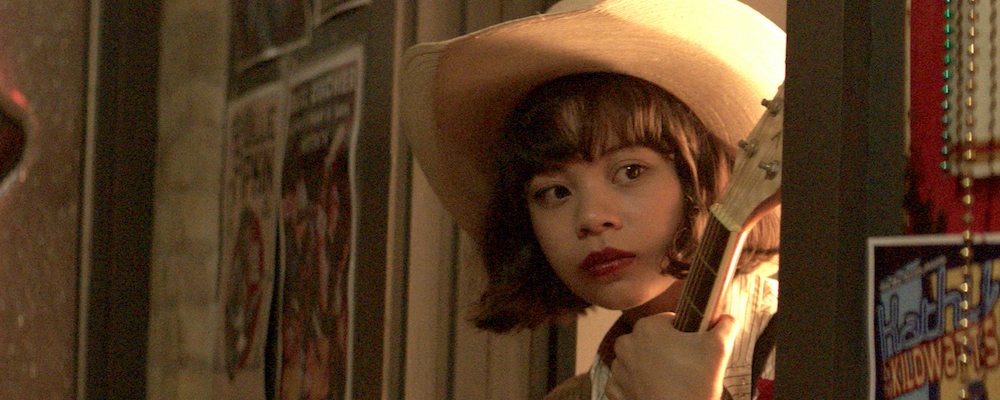‘Yellow Rose’ Sings a Country Ballad About the Perils of Undocumented Life
Alci Rengifo
“Yellow Rose” brings a special touch to the theme of living in the shadows of this country. With a youthful melancholy it evokes a simple, universal idea: Music is one of those art forms that can literally transcend borders and ethnic identities. Rose Garcia (Eva Noblezada) loves country music. She feels it in her bones and writes like a natural. But she has to live in constant fear all due to the fact that she is undocumented.
Director Diane Paragas sets the story in a small Texas town where Rose, who is Filipino, lives with her mother Priscilla (Princess Punzalan). They live and work at a motel as undocumented migrants, which means an ICE raid could upend their lives at any moment. Rose has an obvious gift in her voice and songwriting capabilities, country music history is also tattooed into her memory. This is also noticeable to her only friend in town, Elliot (Liam Booth), who she meets at a guitar shop. Summer becomes nightmarish when the dreaded ICE raid does occur and Priscilla is taken into custody. Rose escapes, but is now left to fend for herself. First she lands in the home of an aunt, Gail (Lea Salonga), but then enters the orbit of a veteran country singer, played by renowned musician Dale Watson. As she also finds a new home at the Broken Spoke, the bar where Dale performs regularly, Rose channels her experience into songs. But Priscilla remains imprisoned by ICE, with the possibility of soon being deported back to Manila.
“Yellow Rose” humanizes the immigrant experience in America with a refreshing approach. Paragas and co-writers Celena Cipriaso and Annie J. Howell have crafted a likeable enough persona with Rose, but they also use her to embody a very keen idea. Those who fear undocumented migration complain about assimilation, language, and how continued influxes from other places will, heaven forbid, change the culture of what has always been an immigrant nation. But Rose demonstrates how roots are better defined by where we grow up, no matter our DNA. She is Filipino and lives with specific cultural norms at home under Priscilla, who can be very conservative in many aspects, like letting Rose go out with Elliot to an Austin concert. But rural Texas is also her home and she lives and breathes its music, dress aesthetic and everything else about the place. Her idols are artists like Patsy Cline. Eva Noblezada, recently a Tony nominee for her work in “Miss Saigon,” brings confidence to the role and the insecurity of someone trapped. Rose lives in a strange social purgatory where her heart belongs to country music, but the white American society readily associated with it is hunting her down.
Paragas wants to make striking points with this story, but she’s also not a complete cynic. The subtle and unsubtle racism of Rose’s world is apparent, even in her nickname, “Yellow Rose,” given to her by clueless classmates. The scenes involving ICE have a terrifying intensity. Paragas captures viscerally the feeling of sleeping in your bed, constantly on alert that a midnight knock at the door could mean capture. Aside from great documentaries like “Immigration Nation,” few moments on film this year will evoke the heartbreak of watching a parent hauled away like the moment when Rose helplessly watches Priscilla’s arrest. At the detention facility even hugs are denied between detainees and their children. Priscilla and Rose’s only crime in this world is that they don’t have the papers the government requires for you to be deemed worthy of walking through this side of the border.
Where Paragas’s more despairing view dissipates is in how the movie also acknowledges there are good people to be found in any town, sometimes where least expected. Staying with Gail doesn’t work out, her white husband is nervous about housing an undocumented immigrant, but the owner of the Broken Spoke, Jolene (Libby Villari), genuinely cares for her. Dale also provides the kind of mentorship Rose desperately needs for her talent, treating her as a musical equal. Typical for most films about high schoolers, Elliot provides the required romantic interest who is also legal status-blind. But his relationship with Rose is written without sappy melodrama. It has a hometown, organic feel.
For country music fans “Yellow Rose” will prove to be a pleasant experience as well. The songs Rose and Dale write together are strong and evocative, full of that wonderful melancholy the genre is so good at. The lyrics could double as love songs and as powerful statements on feeling marooned as an immigrant in certain swathes of the United States (“I never fit in, never could win/Though I tried and tried, this feeling don’t end / I feel out of place, sung out of tune / Like a velvet chair in a dusty saloon”). Paraga somehow finds a way to balance well the film’s story about immigration with a look at the creative process and how a sincere piece of music comes to life.
By bridging cultures via music, “Yellow Rose” reminds us that we can be more connected than divided. A good song can move two people in two different countries in the same way. Yet the most powerful message in this film is precisely that Rose is not an outsider, she loves this music because this is her home, and her roots are diverse, shaped by having been born somewhere else and growing up in a small corner of Texas. Come to think of it, that is the story of the United States.
“Yellow Rose” releases Oct. 9 in select cities.

